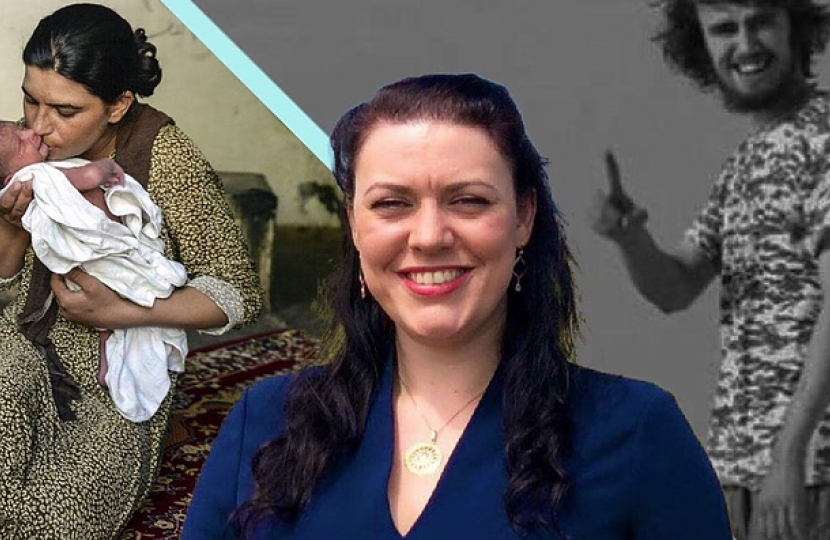
To be a citizen of a country is to recognise and respect the rights and responsibilities you have a constituent member. It is a privilege to hold British citizenship, and to enjoy its protections.
If you unlawfully harm your community, you will be sentenced and hopefully rehabilitated. If you declare war on this country and on the British people; by travelling to join our declared enemies, your sentence should, and must be, the revocation of your British citizenship.
Yet over the last few months we have seen criticism after criticism of the UK Government for stripping these criminals, these terrorists, of their citizenship. Last week, Jihadi Jack’s parents, who have been found guilty by our courts of funding terrorism after sending their son money even once the police had informed them that to do so would be to fund Daesh (so called Islamic State), were the latest to claim this action is wrong. Their protestations found sympathetic ears in some media circles, with the UK Government’s actions blasted as draconian.
Jihadi Jack, Jihadi John, Shamima Begum and all of their fellow terrorists swore an oath to Daesh. They made a decision to get on a plane, to take up citizenship of their so-called Caliphate the Islamic State, and to rescind their UK citizenship. They then also proudly declared Britain their enemy. They declared each of us, our children, our families, our friends and communities targets worthy of being slaughtered, and they knew what they were doing.
Jihadi Jack joined Daesh sometime in mid-late 2014. By this time Daesh had declared its Caliphate, captured and occupied Fallujah and Mosul, taken journalists John Cantlie, James Foley, David Haines and Steven Sotloff hostage; and James Foley had been beheaded by British national Jihadi John and his murder sickeningly celebrated and propagated around the world. Daesh had also kidnapped humanitarian workers Peter Kassig, Alan Henning and 49 Turkish hostages, carried out terror attacks across Iraq and Syria, at a Jewish museum in Belgium, against police officers in Australia and the United States, multiple soldiers in Canada, and carried out the Massacre of Sinjar. They had also carried out public executions, including crucifixions.
Shamima Begum joined in March of 2015. By that time Daesh had added terror attacks in Saudi Arabia, a hotel in Libya, at an event sponsored by a synagogue in Denmark, at a museum in Tunisia, a mosque in Yemen, and the vile and unforgivable murders of Steven Sotloff, David Haines, Alan Henning, Peter Kassig had taken place as well as the murder of Jordanian pilot al-Kasasbeh, whose method of murder was crowdsourced by Daesh before he was burned alive.
This is by no means a comprehensive list of the atrocities perpetrated by Daesh at those times, but you can’t tell me that Shamima and Jack didn’t know who they were joining and what actions they were choosing to endorse and facilitate by joining the terror group. Daesh was not some insurgent force hidden away in remote caves. It had been declared the greatest existential threat to our country by the then Prime Minister David Cameron. They chose to join the enemy. It is the word “chose” that matters here. We must never absolve terrorists, and in particular foreign terrorist fighters, of responsibility for their choices.
Jihadi Jack’s parents last week claimed that the concept of innocent until guilty would be trodden on if we removed his citizenship. Perhaps his parents should meet survivors of Daesh atrocities, so that they can understand the true horror of Jack’s actions, the slaughter perpetrated in his name and genocides that he supported and facilitated, as evidently they do not comprehend them. Their interviews underscore an absolute abdication of their son’s accountability and responsibility for his decisions, and an attempt to instead scapegoat the government. Jihadi Jack has claimed he joined “very bad people”, but not terrorists – very little personal accountability in that statement. The quest to somehow absolve these terrorists of personal responsibility for their actions, and quite frankly any agency over their decisions is not new, and was particularly acute in media reporting and social media discussions about Shamima Begum.
“They don’t have proof that I did anything dangerous” Shamima Begum said. “We should bring her home”, “She’s pregnant”, “She’s a young woman”. The truth always outs. It is sinister how we diminish the threat female terrorists pose to us, as well as being downright sexist. Women are just as dangerous as men. Intelligence showed that Begum would sew her fellow terrorists into suicide vests so that they could not back out, so that they had no choice but to carry out murderous acts. She was also a member of the Al-Khanssaa Brigade, a religious enforcement unit which existed to control women including the use of gruesome punishments against women they deemed to be in breach of Daesh’s moral code. This is why national security decisions are taken once intelligence is available and analysed, not on the hoof for the benefit of the virtue-signalling twitter mob.
In 2017, there were reports of dozens of women carrying out suicide attacks in areas being liberated by Government of Iraq forces. Daesh has not, as yet, claimed responsibility for them, which demonstrates a reluctance on their part to celebrate women as contributing members of the armed Jihad. The lack of press releases issued by Daesh about women suicide fighters should not lull us into a false sense of security: women carry out terror attacks. In my work I have seen women play key roles in terrorist networks, from facilitatory actions to carrying out atrocities themselves. It is true that the majority of female terrorists play roles largely in fundraising, recruiting, promoting of ideologies, and logistics. But we should not downplay or underestimate these functions, for without them terrorist groups cannot operate. Crucially, women in terror groups ensure the day-to-day running of their households and indeed even maintain the continuity of intergenerational radicalisation through social reproduction.
In the cases of both Jihadi Jack and Shamima Begum, people have called for them to be brought home, to face justice here in the UK. There are a multitude of reasons why this is not the right decision. Firstly, just as we expect those who commit crimes in the UK to be tried in the UK, the same must happen elsewhere. The survivors of Daesh and the families of their victims deserve to see the faces of the accused in court, be heard as victims and survivors, and see justice served. Critics of such a process, claim that there is no functioning justice system in Syria, and that the Iraqi justice system allows capital punishment. The majority of foreign terrorist fighters have been moved by the Kurds to detainment camps in Iraq, and it is in Iraq that they should be prosecuted. The death sentence, which I do not personally support, is also in place in countries such as Thailand, India and Japan. To employ such exceptionalism is a rank hypocrisy, we would not countenance crimes of such severity – if perpetrated in the UK by a Russian or Saudi national – to be matters solely for their respective justice systems.
There is however a larger issue. Gathering sufficient evidence of criminality in a war zone is extremely difficult, particularly to meet UK standards of evidence. Despite the UK Government rightly funding organisations who are meticulously gathering evidence, very few foreign terrorist fighters from the UK have been prosecuted on return. We urgently need a new Treason Act, for which Tom Tugendhat is rightly leading the charge. The current legislation was passed in 1351 and focuses on crimes against the monarch – including sleeping with his wife. If effectively written, a new Treason Act would close loopholes and make it easier to secure the convictions we so urgently need to keep our communities and countries safe from terrorists, foreign agents, and those who support hostile states to undertake malign activities within our country. The Treason Act should specifically allow for the removal of citizenship, and for life imprisonment.
My view is shaped by my work for Governments around the world to help defeat and destroy Daesh, but it is driven by my experiences of meeting survivors of Daesh atrocities, and the loved ones of their victims. There should be no right to British citizenship, and just as it comes with rights, it also comes with responsibilities.
The first and foremost responsibility of Government is to keep its people safe. That is exactly what the Conservative Government has done, and I for one, applaud them.


